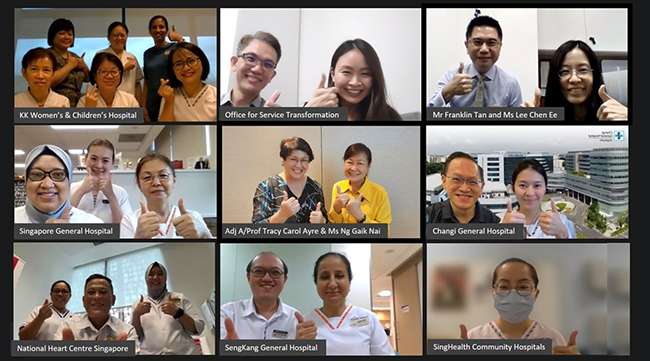SingHealth Duke-NUS Academic Medical Centre will NEVER ask you to transfer money over a call. If in doubt, call the 24/7 ScamShield helpline at 1799, or visit the ScamShield website at www.scamshield.gov.sg.

The team behind eCC
A fully-redesigned inpatient charging process has been rolled out across SingHealth institutions, enhancing patient care and streamlining workflows.
Away from the wards, the daily process of manually writing down chargeable patient procedures and handing these paper slips to the business office had been a bugbear of nurses for years. They had to decipher doctors' notes, carry out required procedures and then manually record all items that were to be billed for multiple patients.
Today, thanks to a total workflow redesign, these tasks are a thing of the past.
Improving efficiency and patient safety
Since late 2021, institutions across SingHealth have steadily switched to a fully digitalised billing system, birthed from an initiative named the Electronic Charge Capturing (eCC) project.
Nurses now simply search for the correct "charge codes" after the necessary procedures have been performed, and add them under a patient's profile in their systems. The consolidated bills are then automatically generated and ready upon the patient's discharge.
Since its roll-out across the cluster, both nursing and non-nursing staff have reported significant savings in time spent on administrative tasks such as recording and charging. For example, Singapore General Hospital (SGH), KK Women's and Children's Hospital (KKH) and National Heart Centre Singapore (NHCS) have reported a total estimated savings of 19,400 hours from this project.
As a result, nurses are now able to spend more time in the wards with patients, optimising the level of clinical care and patient safety. Billing accuracy has also improved.
"There are always distractions that can take us away from clinical duties. By cutting down on administrative tasks, we are better able to focus on patient care, safety and satisfaction," says Ms Patricia Yong, Deputy Director of Nursing at SGH, who co-leads eCC with her counterpart at KKH, Ms Teo Chor Cher.
True team effort
What sounds like a straightforward digitalisation project was anything but – the groundwork was massive, from standardising charge codes across all institutions, to understanding what users needed from the new platform.
In short, to get one single system to work cluster-wide, there was a need to ensure all nursing units were on the same page and bought in.
"We had to go through every single procedure and their respective charge codes. It was a challenging process because a single procedure would sometimes have multiple charge codes tagged to a single procedure– which ones were we to deactivate? How would we harmonise costing across institutions? There were many of such details to refine before we could do this electronically," recalls Ms Teo.
Reflecting on the amount of time put in to see this idea through to fruition since it was seeded in 2017, Ms Yong laughed, "It's a relief that we have reached this point!"
No effort was spared in helping nursing units adapt to the new system, with multiple training sessions and even champions walking the ground on the day of roll-out.
Post-launch, difficulties faced by each department were analysed and addressed expediently. For instance, nurses in charge of critically ill patients who needed complex care faced the time-consuming challenge of looking up and inputting the charge codes of multiple procedures to the system. With eCC, they now benefit from the use of "bundle codes" for multiple procedures to save time. Each department is also able to build their own frequently-used charge codes list.
Both Ms Yong and Ms Teo maintain that eCC could only have achieved its success thanks to the single-minded collaboration of teams and stakeholders.
Not only did senior leadership strongly support their aspirations to redesign the workflow, it was also the steadfast team spirit among over a hundred project participants that brought eCC to life, including Nursing Informatics and Nursing Administration teams, allied health professionals, finance and business offices from across SingHealth institutions, colleagues from the SingHealth Office for Service Transformation (OST) and Integrated Health Information Systems (IHiS) experts who developed the solution.
But what's next for eCC and the team behind it? "We are not calling a stop at this juncture. If and when technology advances, we might evolve the system along the way, perhaps even incorporating artificial intelligence. The most important thing is our motivation to continuously improve," says Mr Tan Teck Choon, Deputy Director, Office for Service Transformation (OST), SingHealth.
Summing up, Ms Teo reflected, "We have a great team that worked well together, even in the face of many challenges, including the COVID-19 pandemic. It has been a long journey, and I am very proud and pleased with the outcome."
© 2025 SingHealth Group. All Rights Reserved.















































